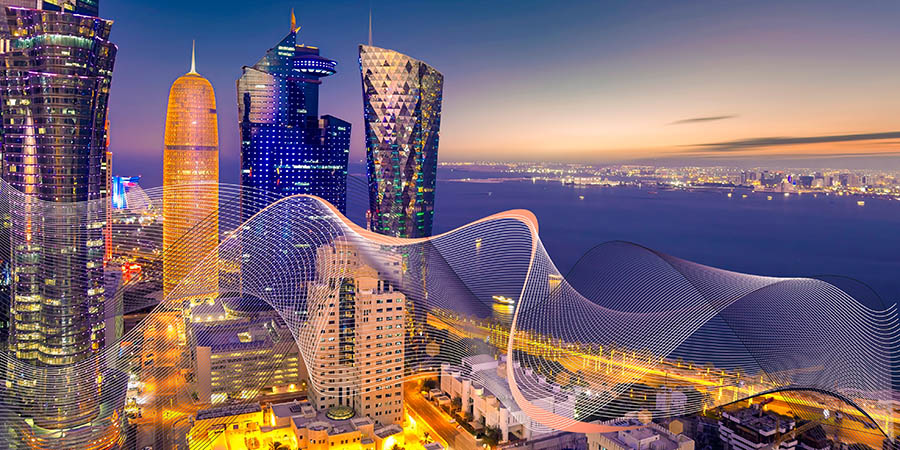Data Centres: Fuelling Economic Growth and Innovation
 Author:
Author:
In an era where data drives global commerce, countries worldwide are investing in data centres to secure their economic futures. These infrastructures are not just technical assets but also, they are engines of job creation, innovation, and cross-border collaboration. For Qatar, a nation committed to diversifying its economy and fostering a knowledge-based ecosystem, data centres represent a cornerstone of its strategic vision.
The Global Surge in Data Centre Investments
The global data centre market is booming, with spending projected to grow at a compounded annual rate of 10% through 2026, according to Structure Research (2022). This was all pre-ChatGPT 3.0 announcements and before power-hungry GPU-laden DCs become a necessarily for LLMs and AI models. Leading this growth are regions like ours in the GCC, especially in the state of Qatar, where forward-thinking policies and investments are unlocking new economic opportunities:
- Qatar has emerged as a regional standout, with Microsoft Azure establishing its first cloud region in Doha in 2021.
- In the UAE, Dubai accounts for 60% of the Gulf’s cloud capacity, supported by over 23 data centres (Government of Dubai, 2022).
- Saudi Arabia’s $500 million data centre fund, launched in 2022, aims to localize 80% of its data by 2030 (Public Investment Fund, 2022).
These initiatives reflect a broader shift toward tech-driven economic diversification, aligning with Qatar’s goals to reduce reliance on hydrocarbons and nurture innovation.
Economic Opportunities: Jobs, Investment, and Global Partnerships
Data centres are magnets for multinational corporations, creating symbiotic relationships that benefit local economies. Qatar’s strategic investments are yielding tangible results:
- Microsoft’s Azure cloud region in Doha has accelerated digital adoption for Qatari businesses, from fintech startups to logistics giants (Microsoft, 2021).
- The Ras Bu Abboud project, developed with international tech firms, is expected to create over 1,000 jobs and generate $1 billion in foreign investment by 2030 (Qatar Free Zones Authority, 2023).
These partnerships underscore Qatar’s role as a hub for digital trade, linking markets in Asia, Africa, and Europe while empowering local talent and businesses.
Sustainability: Balancing Growth with Responsibility
As data centres expand, sustainability remains a priority. According to the International Energy Agency (2022), data centres consume roughly 1% of global electricity. Qatar is addressing this challenge through initiatives like:
- The Tarsheed program, which aims to reduce national energy consumption by 15% by 2025 (Qatar General Electricity & Water Corporation, 2023).
- Solar-powered data centre designs, supported by the country’s investments in renewable energy infrastructure.
Such efforts ensure that economic growth aligns with environmental stewardship, and that is a critical consideration for businesses and investors.
Talent Development: Building a Skilled Workforce
To sustain its digital ambitions, Qatar is prioritizing education and skills development:
- Qatar Science & Technology Park incubates tech startups and partners with global universities to train engineers and data specialists.
- Partnerships with institutions like Carnegie Mellon Qatar are equipping students with expertise in AI, cybersecurity, and cloud computing.
This focus on human capital ensures Qatar remains competitive in a rapidly evolving global market.
Conclusion: Qatar’s Path Forward
For Qatar, data centres are more than infrastructure; they are a catalyst for economic transformation. By attracting global tech leaders, fostering innovation, and investing in sustainability, the country is positioning itself as a destination for forward-thinking enterprises.
For businesses and investors, Qatar offers a stable regulatory environment, cutting-edge infrastructure, and a gateway to emerging markets. As the world embraces a data-driven future, Qatar’s strategic investments today will shape its economic resilience tomorrow.
Sources: All figures and claims are cited from industry reports, government publications, and corporate announcements as noted in the text.
Disclaimer: The views and opinions expressed in this blog post are those of the individual author and do not necessarily reflect the official policy, position, or opinions of the Company, its management, or affiliates. This content is provided for general informational and marketing purposes only and is not intended to offer technical, legal, or professional advice. While reasonable efforts are made to ensure accuracy, the Company makes no warranties regarding the completeness or reliability of the information presented. The Company shall not be held liable for any loss or damage arising from reliance on the content of this blog. This post does not create any contractual or professional relationship with readers.

